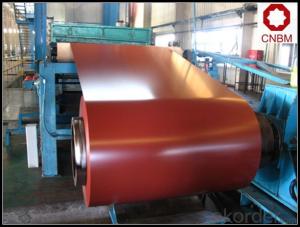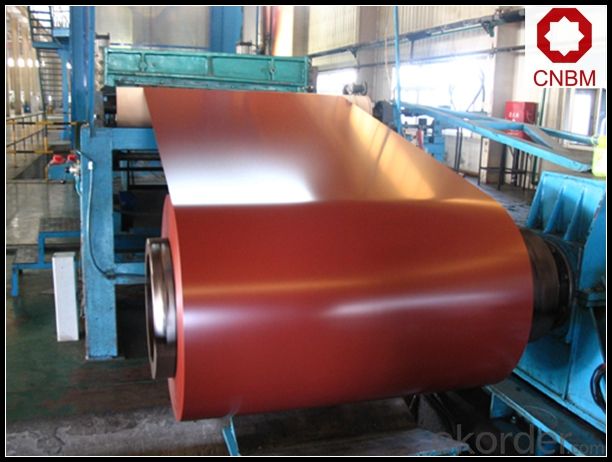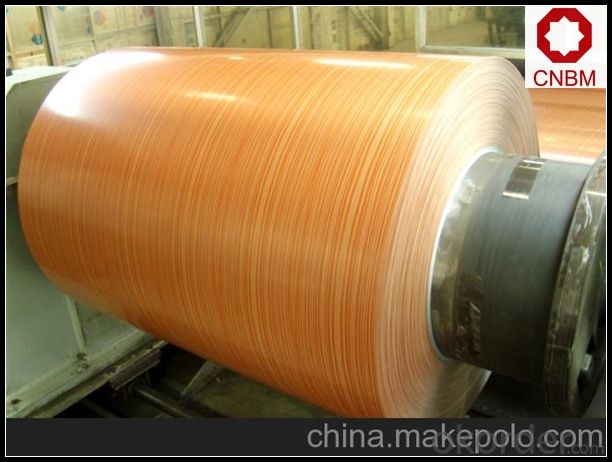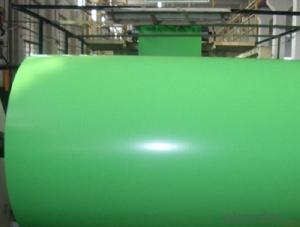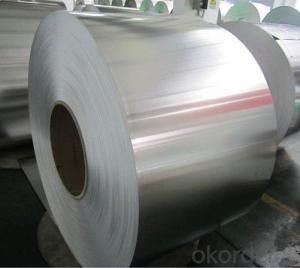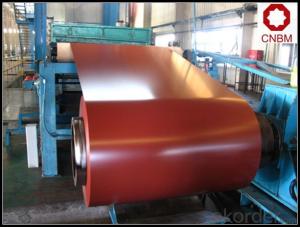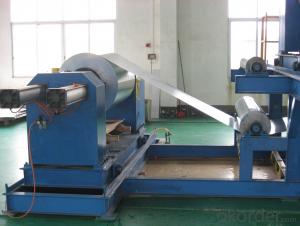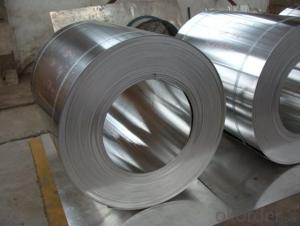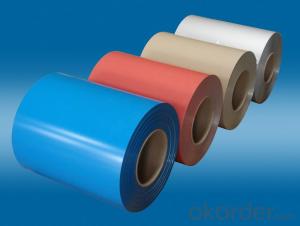5052-H32 Aluminum Coil for Color Coated Aluminum Roller Shutter 0.15 to 1.20mm
- Loading Port:
- Shanghai
- Payment Terms:
- TT OR LC
- Min Order Qty:
- 5 m.t.
- Supply Capability:
- 10000 m.t./month
OKorder Service Pledge
OKorder Financial Service
You Might Also Like
Specification
1. Specification of Color Coated Aluminium Coils for Aluminum Roller Shutter 0.15 to 1.20mm
Thickness | 0.1mm-10mm |
Popular Thickness | 0.1mm/0.2mm/0.25mm/0.3mm/0.6mm/0.8mm/1.0mm/1.2mm/1.5mm/2.0mm/3.0mm... |
Width | 20mm-2500mm |
inner diameter | 505mm 508mm 605mm |
Material | 1050,1060,1070,1100,1200,3003,3004,3005,5052,5005,5754,5083 |
Temper | O,H12,H14,H16,H18,H22,H24,H26,H32,H34,H36,H38,H111,H112 |
Surface | mill finish |
Packing | Export standard wooden pallets |
Payment Terms | 100% irrevocable L/C at sight or 30% T/T in advance as deposit,70% balance against the B/L copy |
Minimum Order Quantity | 5000kg |
Delivery time | 15-25 days after receiving L/C or deposit |
Remark | Specific requirement of alloy grade, temper or specification can be discussed at your request |
2. Application of Color Coated Aluminium Coils for Aluminum Roller Shutter 0.15 to 1.20mm
(1).Interior: wall cladding, ceilings, bathrooms, kitchens and balconies, shutters, doors...
(2).Exterior: wall cladding, facades, roofing, canopies, tunnels,column covers , renovations...
(3).Advertisement: display platforms, signboards, fascia, shop fronts...
3. Feature of Color Coated Aluminium Coils for Aluminum Roller Shutter 0.15 to 1.20mm
*Such coil is specially designed to replace aluminum ingot, due to the high export tax of aluminum ingot, the coil has better price than ingot.
*This type of coil can fit customer's remelting furnace just like ingot, no need to make any change to the production line that was previously used for ingot. The standard coil size and weight is very suitable for the feed gate of furnace.
*This type of coil causes less material wastage than ingot when remelted.
*Our coil is made directly from ore, no need to go though the ingot making process, quality is much better than other suppliers who use ingot scrap to make coil.
Be free from Oil Stain, Dent, Inclusion, Scratches, Stain, Oxide Dicoloration, Breaks, Corrosion, Roll Marks, Dirt Streaks and other defect which will interfere with use
4. Certificate:
SGS and ROHS(if client request, paid by client), MTC(plant provided), Certificate of Origin(FORM A, FORM E, CO), Bureau Veritas and SGS (if client request, paid by client), CIQS certificate
5. Image of Color Coated Aluminium Coils for Aluminum Roller Shutter 0.15 to 1.20mm
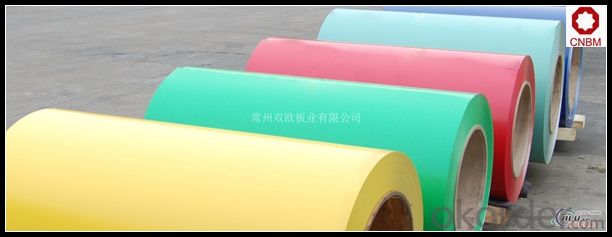
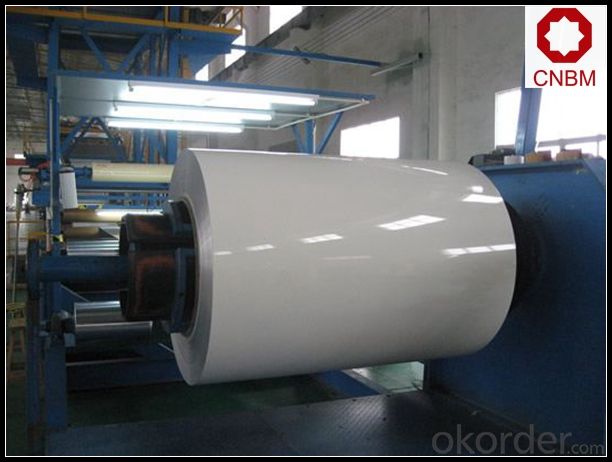
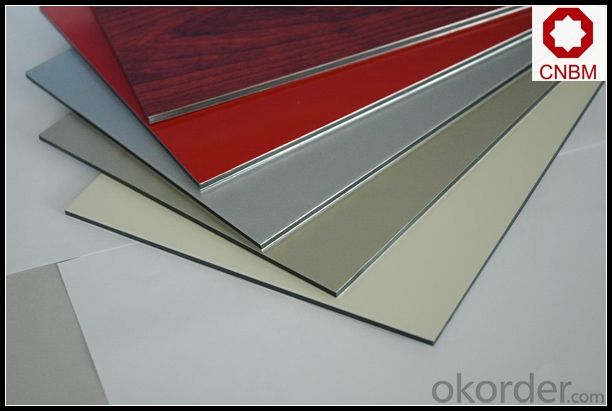
6. Package and shipping of Color Coated Aluminium Coils for Aluminum Roller Shutter 0.15 to 1.20mm
eye to wall
eye to the wall
with wood pallet (wooded case also available)
7. FAQ
1) What is the delivery time?
Dpends on actual order, around 20 to 35 days
2)What is the QC system:
We have QC staff of 20 persons and advanced equipment, each production is with MTC traced from Aluminum ingot lot.
3) What market do you mainly sell to?
Australia, America, Asia, Middle East, Western Europe, Africa etc
- Q: Can aluminum coils be used in the production of household appliances?
- Yes, aluminum coils can be used in the production of household appliances. Aluminum is a lightweight, durable, and corrosion-resistant material, making it suitable for various applications in appliances such as refrigerators, air conditioners, and cooktops. Additionally, aluminum coils offer excellent heat transfer properties, making them an ideal choice for enhancing energy efficiency in appliances.
- Q: How are aluminum coils protected against chemical exposure?
- Aluminum coils are protected against chemical exposure through the application of corrosion-resistant coatings or anodizing processes. These protective measures create a barrier between the aluminum surface and the chemicals, preventing direct contact and minimizing the risk of corrosion or degradation.
- Q: What are the differences between aluminum coil 3003h24 and 3a21h14?
- The mechanical property references of rolled plate 3003 H24and 3A21 H14 are as follows: 3003 H24--Rm/MPa≧140-180;Rp0.2/MPa≧115;A(%)≧1-5(thickness 0.2mm-4.5mm)3A12 H14--Rm/MPa≧145-215;A(%)≧6
- Q: What are the color options available for aluminum coils?
- Aluminum coils offer a wide array of color choices, with options that are both extensive and diverse. The technique of coil coating enables the application of a broad spectrum of colors onto the aluminum surface, enhancing its visual appeal while providing added protection against corrosion and weathering. Numerous popular color options are available for aluminum coils, including white, black, gray, silver, bronze, and metallic finishes. In addition, tailored colors can be created to suit specific design preferences or brand requirements. This involves a color matching process where the desired color is formulated and subsequently applied to the aluminum coils. It is important to note that the availability of color options may vary depending on the manufacturer and supplier. However, advancements in coil coating technology have greatly expanded the range of color choices for aluminum coils, allowing for increased flexibility in design and aesthetics.
- Q: I live around Minneapolis, MN. Is there a place that you can recycle crushed aluminum cans for money around here?
- Go to the Earth911 website. Enter in your zip code and it will give you a list of recyclers closest to you. Minnesota does not have a can bottle deposit so the money you get will be for the scrap metal.
- Q: Can aluminum coils be utilized as materials for constructing roofs?
- <p>Yes, aluminum coils can be used for roofing materials. They are known for their durability, corrosion resistance, and lightweight properties, making them an excellent choice for roofing. Aluminum's reflective surface also helps in energy efficiency by reflecting sunlight and reducing heat absorption. It's recyclable and has a long lifespan, which contributes to its sustainability. However, it's important to ensure that the aluminum coils are of the appropriate gauge and quality for the specific roofing application to guarantee structural integrity and performance.</p>
- Q: Is it possible to utilize aluminum coils in the manufacturing of furniture?
- <p>Yes, aluminum coils can be used to make furniture. Aluminum is known for its strength, durability, and resistance to corrosion, making it an ideal material for furniture construction. It is commonly used in outdoor furniture due to its weather resistance. Aluminum coils can be formed into various shapes and sizes to create frames, legs, and other structural components of furniture. Additionally, aluminum's lightweight nature makes it easy to handle and transport, which is beneficial for both manufacturers and consumers.</p>
- Q: How are aluminum coils tested for quality and performance?
- Aluminum coils are tested for quality and performance through various methods including visual inspections, dimensional measurements, mechanical property testing, and corrosion resistance testing. These tests help ensure that the coils meet specific standards and requirements for their intended applications.
- Q: Explain how the temperature affects aluminum coil properties and behavior.
- <p>The relationship between aluminum coil and temperature is significant as temperature influences the coil's physical properties and performance. At lower temperatures, aluminum coils become more brittle and susceptible to cracking or breaking. As the temperature increases, aluminum's ductility improves, allowing it to be more easily shaped and formed. However, excessive heat can also lead to deformation and loss of strength. The thermal conductivity of aluminum is high, meaning it conducts heat well, which is useful in applications requiring heat transfer. Additionally, the electrical conductivity of aluminum is affected by temperature; as temperature rises, resistance increases, which can impact applications where electrical conductivity is critical.</p>
- Q: How do aluminum coils compare to other non-ferrous metals like titanium?
- Aluminum coils and other non-ferrous metals like titanium have distinct characteristics that differentiate them in terms of their properties and applications. While both metals are non-ferrous and share similarities such as excellent corrosion resistance and lightweight properties, they have several differences that set them apart. Firstly, aluminum is more commonly used and readily available compared to titanium. It is also more affordable, making it a cost-effective choice for many industries. Titanium, on the other hand, is relatively rare and expensive due to its complex extraction process, limiting its widespread use. In terms of strength, titanium is significantly stronger than aluminum. Titanium alloys possess exceptional strength-to-weight ratios, making them suitable for applications where high strength is a requirement, such as aerospace and military industries. Aluminum, although not as strong as titanium, is still widely used in various industries due to its good strength-to-weight ratio. Another key difference lies in their melting points. Titanium has a significantly higher melting point compared to aluminum, making it more resistant to high temperatures. This characteristic makes titanium ideal for applications involving extreme heat, such as aircraft engines and components for the chemical industry. Aluminum, on the other hand, has a lower melting point, making it more suitable for applications that require good thermal conductivity, like heat exchangers and electrical wiring. Furthermore, titanium has superior resistance to corrosion compared to aluminum. While aluminum is known for its excellent corrosion resistance, titanium surpasses it in terms of durability, especially in highly aggressive environments, such as saltwater or chemical exposure. This property makes titanium a preferred choice for marine applications, offshore structures, and chemical processing equipment. In summary, aluminum coils and titanium are both valuable non-ferrous metals with unique properties and applications. Aluminum is widely used due to its affordability, availability, and good strength-to-weight ratio, while titanium offers exceptional strength, high-temperature resistance, and superior corrosion resistance at a higher cost. Understanding their differences allows industries to choose the most suitable metal for their specific needs and requirements.
Send your message to us
5052-H32 Aluminum Coil for Color Coated Aluminum Roller Shutter 0.15 to 1.20mm
- Loading Port:
- Shanghai
- Payment Terms:
- TT OR LC
- Min Order Qty:
- 5 m.t.
- Supply Capability:
- 10000 m.t./month
OKorder Service Pledge
OKorder Financial Service
Similar products
Hot products
Hot Searches
Related keywords
